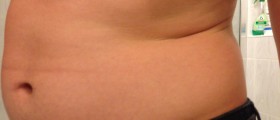Birth Control Pill
Current contraceptive pills do not cause weight gain, claim the experts. There are about 5 to 10% of the women, which might gain some weight, but it is not linked with the usage of the pill.
Low dose oral contraceptives do have adverse effects, such as retention of the fluids and fat buildup. Scientists explain that these effects are present in women extremely sensitive to hormones in the birth control pills.
Some hormonal contraceptives, such as the "mini pill" and the hormone-releasing contraceptive coil, contain only one hormone. For many women, hormonal contraceptives are the most convenient form of birth control because they do not have to think about it before or during sex and they are in control of it themselves. The pill is the most widely used form of birth control in many countries.
- Theoretically, hormonal contraceptives could contribute to weight gain if they led to fluid retention and increased body fat. Also, combined contraceptives are sometimes believed to increase appetite. But it’s not that easy to say whether that’s true because women who don’t use hormonal contraceptives also gain weight as they age.
- Researchers from the Cochrane Collaboration looked for such good-quality studies on hormonal contraceptives in which weight was recorded. They were only able to find a few studies that compared hormonal contraceptives with “fake” hormonal contraceptives (placebos) and measured the impact on weight. This is not that surprising, though. Because hormonal contraceptives are so reliable, not many women are willing to use contraceptives that could be less effective or may even be placebos and not work at all.
- None of the studies found by the researchers show a clear link between hormonal contraception and weight gain. But these studies did not have enough participants and were not well-designed to be able to provide a definite answer. In addition, most of the studies didn’t record the participants' weight very carefully. At most, only the number of women who reported that they stopped taking the pill because of weight gain was recorded. So it's not possible to say for sure whether the participants who used hormonal contraceptives gained more weight than the women in the other group.
- Because of this, one group of researchers also looked for studies where different combined contraceptives were compared with one another and weight was carefully recorded. They found 45 studies in which many different types of hormonal contraceptives were compared. So it's difficult to tell how the individual types affect weight. What’s more, no link was found between hormone dosage and weight gain. If hormones really did influence weight gain, then you would expect higher doses to lead to more weight gain. Such a link was not established.
Potential Weight Gain Causes
Older Contraceptive Pills
Older birth control pill (DeproProvera and other) contain much higher doses of hormones, and women usually gain about 2.5-3kg (5.3-6.6lbs) when using these pills. The conducted studies show that some women gain weight, while other lose some pounds. Possible cause of the weight loss was the nausea as the side effect of these pills, which affected the appetite of women.
Water Retention
Female sexual hormone estrogen is responsible for the water retention in women using contraceptive pills. Estrogen stimulates renin-angiotensin system in the kidneys, thus causing retention of water and weight gain. Birth control tablets available on the market are all low in estrogen, and because of that less likely to cause increase of the body weight.
Appetite Stimulant
Contraceptive pills can raise insulin levels and insulin resistance in the body and prevent the weight loss, even if the woman is on restrictive diet. Women with glucose metabolism abnormalities might gain some extra pounds while using the medications.
Other Causes
The formulation of the pill may affect your weight. Every pill contains progestin and estrogen, and sometimes, certain progestin or the combination of a progestin and estrogen might cause weight gain. Some pills, especially those that contain desogestrel (Desogen, Ortho-Cept) are known to have lower prevalence of weight gain than some other contraceptive pills. On the other hand, the birth control tablets with norethindrone (Ortho Novum 7/7/7) have increased risk of unwanted weight gain.
When to Talk to Your Doctor about Birth Control Pills
Doctors advise using the oral contraceptives with 20mcgm of estrogen, to minimize the risk of weight gain. Currently, these are: Alesse, Levlite, Loestrin-Fe and Mircette.
Be aware that if you gained more than 5% of your current weight, you could be experiencing problems with abnormalities in the glucose metabolism or with insulin resistance. Consult your doctor about the possibility of these conditions. The solution could be the low carbohydrates diet. These patients are advised to avoid sugar and food rich in carbohydrates, since it could affect their weight and cause weight gain.


















Your thoughts on this
Loading...